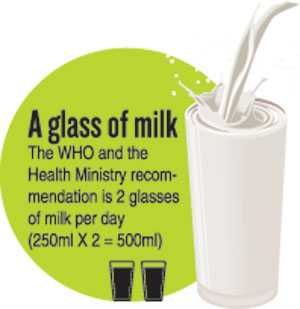News
The goodness of milk
Milk is on the minds of men, women and children, with all and sundry being swirled and swished about. They are not being left in a world full of milk and honey but in a very confused and confounded state.

Dr. Ranil Jayawardena
Numerous are the mothers and fathers including professionals such as doctors, scratching their heads in befuddlement, who have asked the Sunday Times a very simple question.
Is milk good or bad for humans including children?
In the light of milk being in the eye of the storm in recent times, with different groups making contradictory claims, the Sunday Times spoke to impartial and independent Consultant Clinical Nutritionist Dr. Ranil Jayawardena.
“We don’t need food, what we need is energy and nutrients,” says this medically-qualified nutritionist setting the picture right before stirring a glass of milk to look closely at it. And to get all our energy and nutrients we need different groups of food.
Dr. Jayawardena is a Senior Lecturer of the Department of Physiology, Faculty of Medicine, University of Colombo and also a Visiting Fellow at Queensland University of Technology, Brisbane, Australia. He has many publications in prestigious journals to his credit.
Explaining why he says that people don’t need food, he points out that some patients who have gut issues have been on ‘parenteral’ nutrition administered intravenously and have survived for more than two decades without actually eating any solid food or drinking any liquids, he says.
 Methodically, he explains that we get our energy through carbohydrates, proteins, fats and also alcohol (though doctors do not encourage its consumption), while from the nutrients come vitamins and minerals.
Methodically, he explains that we get our energy through carbohydrates, proteins, fats and also alcohol (though doctors do not encourage its consumption), while from the nutrients come vitamins and minerals.
In ancient times, humans ate food “merely for survival” and it is only in modern times that we are relishing our food, it is understood.
Stressing that “no ‘one’ food provides all the energy and nutrients” we need, he points out that public health experts have divided foods into five “basic” groups depending on their distinct composition.
These food groups are:
- Cereal or equivalents – such as rice, bread, jak, potato string hoppers etc.
- Vegetables – raw or cooked pathola, carrot, beetroot, beans, mallung etc.
- Fruits – fresh or dried fruit as well as fresh fruit juices including banana, papaya, mango, grapes etc.
- Meat or equivalents – chicken, fish, egg, beef, pork etc.
- Milk and dairy products (kiri saha kiri ahara) – liquid or powdered milk, yoghurt and curd.
So why should we drink milk and eat dairy products, he asks, answering that it is a source to get the benefits of nutrients.
(Next: Dipping into the controversy over liquid milk and powdered milk)
| Breast milk and not infant formula best for baby Categorical is Dr. Ranil Jayawardena that he has turned the spotlight on milk and not infant formula. For newborns, the best milk is breast milk, he reiterates, pointing out that there are strict Health Ministry guidelines on exclusive breastfeeding up to six months from birth and continued breastfeeding after six months up to two years, along with other complementary food. It is only and only if a newborn’s mother has serious issues which prevent her from breastfeeding her baby or the newborn himself/herself has some problems which deter breastfeeding, that the newborn is given infant formula on medical advice, he adds. | |
| Milk has calcium, protein, phosphate and potassium, while yoghurt and curd also have probiotics Lifting milk to the light and scrutinizing it, Dr. Ranil Jayawardena reiterates that there are many benefits from drinking milk. However, he is quick to point out that the benefits given below will come by drinking a ‘glass’ of milk or two which could be in the form of liquid milk (fresh, pasteurized or sterilized). Dr. Jayawardena reiterates that just stirring in a small quantity (about two teaspoons) of either liquid or powdered milk into a cup of tea will not give the nutritional benefits or even come close to providing these benefits listed below. The benefits of milk are: A good source of calcium — it is a “readily available” and good source of calcium which is a mineral required to maintain strong bones and carry out many important functions. Calcium is generally stored in bones and teeth. “Sometimes calcium cannot be absorbed properly but a good source for this mineral is both breast and cow’s milk,” he says, pointing out that in some countries people secure 50% of their calcium requirement from cow’s milk. In Sri Lanka, studies reveal there is a high prevalence of osteoporosis especially among menopausal women most probably due to poor dietary habits, adds Dr. Jayawardena. A source of protein – One glass of milk (250ml) has 8 grams of protein. According to Dr. Jayawardena we need to have in our diet, 0.8 grams per kilogram of our body weight as our protein intake daily. So, if a person is 80kg, that person’s daily protein requirement would be 64 grams. For a normal Sri Lankan, the general recommendation of public health experts both in the World Health Organization (WHO) and the Health Ministry is two glasses of milk per day (250ml X 2 = 500ml). This will provide the person drinking the milk 16 grams of protein a day. These 16 grams of protein a day would be equivalent to a normal Sri Lankan getting 20-25% of that person’s daily requirement (100 X 16 divided by 64) from two glasses of milk. According to Dr. Jayawardena, available national data indicate that Sri Lankans have a protein deficiency, while adults also seem to be getting only 10% of their calories from protein, which is less than the requirement of 15%. He says that Sri Lankans having less muscle mass and stunting in children could also be one of the reasons of our reduced consumption of protein. A source of other nutrients – these include phosphate and potassium. The benefits of dairy products (yoghurt and curd), in addition to those mentioned above, include: Probiotics – these live bacteria and yeasts are good for humans especially for their digestive system. Usually, in Sri Lanka we don’t get these live bacteria and yeasts from other sources as we rarely consume fermented foods such as kimchi, says Dr. Jayawardena. Hecites the example of people in many parts of Sri Lanka being in the habit of eating curd, sometimes even with their rice, which is good for them. Looking at the other side of the glass of milk, Dr. Jayawardena says that some of the negative effects include: If people with non-communicable diseases (NCDs) – including mainly heart disease – which are gripping the world keep gulping down full cream milk, their disease condition would get exacerbated as full cream milk has saturated fats, cholesterol and a small amount of trans fats. However, an option for such people could be low-fat or non-fat milk. Low-fat and non-fat milk will cut-out the risks but keep the benefits of milk.
|

